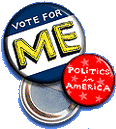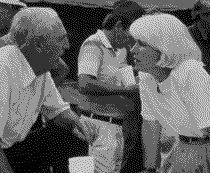
![]()
![]()
Introduction
----
How to Use
this Guide
----
Program
Descriptions
----
Previewing
Questions
----
Postviewing
Activities
----
Discussion
Questions
----
Enrichment
Activities
----
Student Page
----
Related
Resources
----
Credits
- Ask students if they think there is one American political culture. Do Americans share a set of attitudes and assumptions powerful enough to shape their politics?
- In the series we travel from the retirement communities in South Florida to the streets of Chicago, Illinois. As Vote for Me covers politics in action, ask students to describe how the process of getting elected would differ in these two areas.
- Before students watch the series, divide them into groups. Have each group make a list of characteristics and personality traits it would expect to see in someone running for political office. Write them on the blackboard. Then ask students to watch the series and write down the characteristics of the candidates who are portrayed. Have students compare what they wrote with the characteristics listed on the blackboard. Ask students to account for any differences?
- Present the term "negative campaigning" to students and ask if they understand its meaning. Ask students to cite examples of negative campaigning from their own memory or experience. Ask them to consider whether any "good" can come from negative campaigning. After students watch the series, ask them to write down examples of negative campaign approaches. Encourage them to look for examples of ads that, though negative, still "tell the truth!"
- Using examples from American history present the term "political machine" to the group. Guide the class in a discussion of the notion that a big city organization, such as Chicago, can hold an important place in the nation's political lore and is capable of delivering a vote with mechanical regularity.
- Ask the group what sort of organization comes to mind when they think of the term "interest group." Ask students to define the purpose of an interest group and make a list of those groups. Analyze the list. What political activities are these contributors interested in? After students have completed the activity provide them with a list of interest groups. Compare this list with the students'. Who spends the big dollars?
- Opinion surveys usually find the public distressed about negative tactics in politics. But when candidates resort to negative tactics they seem to work. Can you be honest and fair in a negative ad? Can you lie in a positive ad? Ask the class to give examples from the programs.

Maggie Lauterer, candidate for Congress, North Carolina, 1994; Photo: Louis Alvarez